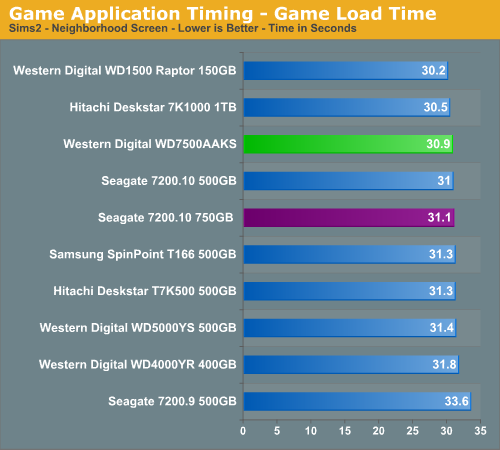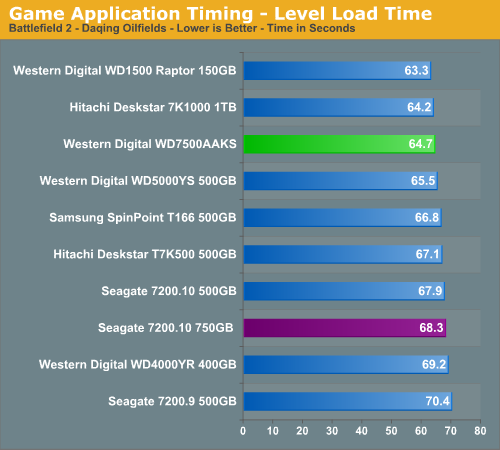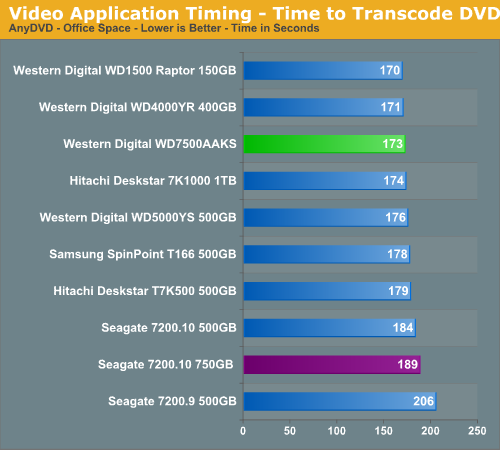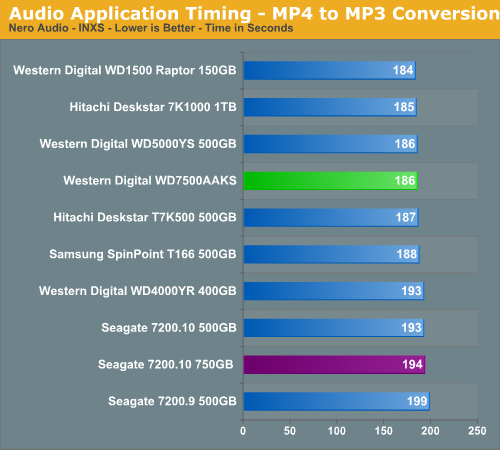Western Digital SE16 750GB: "Quiet" a Performer
by Dave Robinet on August 9, 2007 2:00 AM EST- Posted in
- Storage
Actual Application Performance
Our application benchmarks are designed to show application performance results with times being reported in seconds, lower scores thus being better. While these tests will show some differences between the drives it is important to understand we are no longer measuring the pure performance of the hard drive but how well our platform performs with each individual drive. The performance of a hard drive is an integral part of the computer platform but other factors such as memory, CPU, core logic, and even driver choice can play a major role in determining how well the hard drive performs in any given task.
Game Load Test
Our Sims 2: Open for Business test measures the time it takes to load the initial portion of the game. Our application timer starts when the game icon is initiated until the neighborhood menu appears.

In this example of a real-world test, we can see that the differential between the fastest and slowest hard drives in our benchmarks has become considerably smaller. The Raptor and Hitachi continue to place first and second respectively, though the Western Digital WD7500AAKS now turns in numbers within a fraction of a second of those drives. Of note, the Seagate 7200.10 is still bested by the WD7500AAKS, but the real-world performance levels between the two drives (like those of the other drives) are significantly closer.
Game Level Load
This test centers on the actual loading of a playable level within our game selection. The Battlefield 2 test measures the time it takes to load the Daqing Oilfields level. Our application timer begins when the start single player icon is initiated and ends when the join game icon is visible.

Continuing the real world example from above, the differential in level load times between the top performer (the Raptor) and the Western Digital WD7500AAKS is only one second (or 1.5 percent). From a price-performance standpoint, this speaks volumes, as the Raptor carries a price premium of $1.01 per GB of storage more than the WD7500AAKS. The Seagate 750GB drive is about 5% slower than our review drive in this test.
AnyDVD 6.1
Our next test has us utilizing the "ripping" function of AnyDVD to copy the Office Space DVD file from our source drive to our test drive. Our DVD features 29 files totaling 7.55GB of data and is an excellent test for determining the write speed of a drive.

Western Digital drives extend their dominance in this benchmark, taking three out of the top four slots in our chart. The WD7500AAKS comes in slightly ahead of the Hitachi 1TB drive for the first time in the real-world benchmarks, and handily trounces the Seagate 750GB drive.
Nero Audio Encode
Our last test has us utilizing the audio encoding functions of Nero to convert our INXS Greatest Hits audio files in MP4 format to a high quality variable rate MP3 file for our portable player. Our test features 16 files totaling 137MB of data and is an excellent test for determining the read and write speed of a drive.

The Hitachi 1TB manages to climb back above the Western Digital drive in this test, though the WD7500AAKS maintains its third-place position. The Seagate 750GB is once again handily defeated by the Western Digital drive, though the differential shrinks when the test shifts from a "mainly write" benchmark (as in the AnyDVD test) to a read-write combination test like this one.
Our application benchmarks are designed to show application performance results with times being reported in seconds, lower scores thus being better. While these tests will show some differences between the drives it is important to understand we are no longer measuring the pure performance of the hard drive but how well our platform performs with each individual drive. The performance of a hard drive is an integral part of the computer platform but other factors such as memory, CPU, core logic, and even driver choice can play a major role in determining how well the hard drive performs in any given task.
Game Load Test
Our Sims 2: Open for Business test measures the time it takes to load the initial portion of the game. Our application timer starts when the game icon is initiated until the neighborhood menu appears.

In this example of a real-world test, we can see that the differential between the fastest and slowest hard drives in our benchmarks has become considerably smaller. The Raptor and Hitachi continue to place first and second respectively, though the Western Digital WD7500AAKS now turns in numbers within a fraction of a second of those drives. Of note, the Seagate 7200.10 is still bested by the WD7500AAKS, but the real-world performance levels between the two drives (like those of the other drives) are significantly closer.
Game Level Load
This test centers on the actual loading of a playable level within our game selection. The Battlefield 2 test measures the time it takes to load the Daqing Oilfields level. Our application timer begins when the start single player icon is initiated and ends when the join game icon is visible.

Continuing the real world example from above, the differential in level load times between the top performer (the Raptor) and the Western Digital WD7500AAKS is only one second (or 1.5 percent). From a price-performance standpoint, this speaks volumes, as the Raptor carries a price premium of $1.01 per GB of storage more than the WD7500AAKS. The Seagate 750GB drive is about 5% slower than our review drive in this test.
AnyDVD 6.1
Our next test has us utilizing the "ripping" function of AnyDVD to copy the Office Space DVD file from our source drive to our test drive. Our DVD features 29 files totaling 7.55GB of data and is an excellent test for determining the write speed of a drive.

Western Digital drives extend their dominance in this benchmark, taking three out of the top four slots in our chart. The WD7500AAKS comes in slightly ahead of the Hitachi 1TB drive for the first time in the real-world benchmarks, and handily trounces the Seagate 750GB drive.
Nero Audio Encode
Our last test has us utilizing the audio encoding functions of Nero to convert our INXS Greatest Hits audio files in MP4 format to a high quality variable rate MP3 file for our portable player. Our test features 16 files totaling 137MB of data and is an excellent test for determining the read and write speed of a drive.

The Hitachi 1TB manages to climb back above the Western Digital drive in this test, though the WD7500AAKS maintains its third-place position. The Seagate 750GB is once again handily defeated by the Western Digital drive, though the differential shrinks when the test shifts from a "mainly write" benchmark (as in the AnyDVD test) to a read-write combination test like this one.










37 Comments
View All Comments
retrospooty - Thursday, August 9, 2007 - link
"There seems very little reason to even consider a Raptor anymore. "Except for hte fact that the Raptor 150 is 1 1/2 years old (thats older than the 7200.10 you mentioned) and a 300g Raptor, hopefully with 32m cache is also right around the corner. A300g Raptor with 32m cache will once again own the retail sector by a wide margin.
mostlyprudent - Thursday, August 9, 2007 - link
It will be interesting to see what new Raptor with 32MB of cache can do. I am still skeptical whether it will be able to manage the kind of performance advantage the Raptors had when they were first introduced. I personally think WD will have a tough time charging a significant price premium over other 300GB drives, let alone 750GB and 1TB drives.yyrkoon - Monday, August 13, 2007 - link
You mean the 'whopping' 58MB/s average ? The raptors when first released had issues. Less so now, and they perform much better. Not good enough to justify the cost in my opinion, but whatever floats your boat . . .
ceefka - Friday, August 10, 2007 - link
The Raptor would need more than 32MB cache to get (far) ahead of the pack again, like it did when it was first introduced. Three things they can do:1. Higher density platter :perpendicular
2. 15K rpm? I don't even know if that is possible, but it would be cool.
3. Like you said: 32MB or even more cache.
Martimus - Wednesday, August 15, 2007 - link
The higher density would slow it down, because the heads would need to be more precise. I think that is why the raptors always have less capacity than their caviar brand.retrospooty - Friday, August 10, 2007 - link
Right now the Raptor 150 is ahead of the pack with 16m cache vs 32, and a much lower density per platter, and no perpendicular storage. Add those 3 things and we might be cooking. I have heard rumors that 15k is in the works, but not confirmed.Basilisk - Thursday, August 9, 2007 - link
Or, you may need something loud enough to drown-out your partner's snoring. :)yyrkoon - Monday, August 13, 2007 - link
Funny that, I own a 750GB Seagate, the computer sits less than 4 feet from my head when I sleep up on a desk, and I cannot hear it. Now, If it were not the end of summer, and I were not living in the desert, had all my fans off, I MAY hear the occational disk chatter, but I'll be dahmed if it would ever keep me awake . . .Sometimes I wonder about some of you guys . . .
retrospooty - Thursday, August 9, 2007 - link
??? I dunno. I see AT's comparison always has the Raptor being loud, but I hafve had 1 36g 2 75g and 2 150g Raptors, none of them have been noisy at all, not even compared to other drives. Was I just lucky or is AT's samples unlucky?semo - Thursday, August 9, 2007 - link
is there a difference between the serial ata and the pata se16 wd drives?